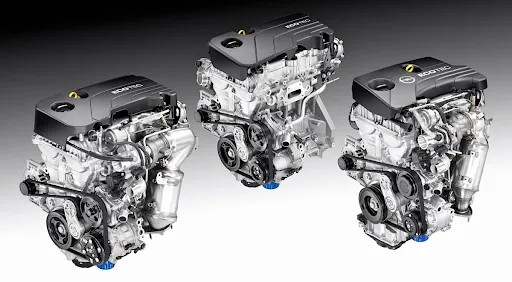Mon - Fri: 8am - 5pm, Sat - Sun: Closed

6-36 Month Warranties
We Ship Local.
Hablamos Español.
Connect with
GM AFM/DOD Lifter Failures Explained
AFM lifter failure
Understanding AFM and DOD Technology
AFM (Active Fuel Management) and DOD (Displacement on Demand) were GM’s innovations designed to improve fuel economy by deactivating select cylinders under light load conditions. Although efficient in theory, these systems depend on specialized hydraulic lifters that are extremely sensitive to oil pressure and cleanliness. Over time, factors such as varnish buildup, poor maintenance, or extended idle periods can cause these lifters to collapse or stick, disrupting proper cylinder operation and performance.
When AFM or DOD lifters fail, the affected cylinders lose compression, resulting in rough idle, ticking noises, and engine misfires. These problems are especially common in GM 5.3 AFM engines and other LS-based platforms. Identifying early warning signs helps prevent top-end damage and reduces costly repairs.



Symptoms of AFM lifter failure include ticking noises, random misfire codes, and noticeable power loss, often triggering a check-engine light for camshaft or crank sensor faults. Technicians confirm failure through oil pressure testing and cylinder deactivation scans. If several lifters show collapse, a full teardown or DOD delete is the most reliable fix. Addressing AFM lifter failure early prevents major engine damage, restores proper performance, and ensures long-term reliability in GM engines equipped with AFM or DOD systems.
Repair Options and AFM Delete Kits

Repair approaches depend on budget and vehicle purpose. A basic AFM lifter replacement may be suitable for newer or lower-mileage trucks, restoring proper function at a reasonable cost. However, for higher-mileage or work vehicles, an AFM delete kit is often the smarter choice. These kits include non-AFM lifters, valley cover plugs, and required AFM tuning updates that permanently disable cylinder deactivation while maintaining smooth drivability and consistent performance.
When performing a DOD delete, upgrading supporting components such as oil pumps, pushrods, and gaskets is highly recommended to stabilize oil pressure and extend overall engine life. Houston Engines offers fully remanufactured GM long blocks with optional AFM delete configurations, designed for reliability and ease of installation. Each reman unit is thoroughly tested and backed by comprehensive warranties for lasting peace of mind.
Deleting AFM slightly reduces fuel efficiency but significantly improves durability, especially for trucks used in towing, hauling, or other heavy-duty applications. This tradeoff ensures long-term reliability, consistent power delivery, and reduced maintenance issues. For drivers seeking dependable performance and lasting engine strength, an AFM delete is a smart investment. For more details, expert advice, or personalized build recommendations, contact us at Houston Engines to explore the best AFM delete options tailored to your vehicle and performance goals.
Prevention and Maintenance Best Practices
Use only premium motor oil that meets GM dexos standards to maintain proper lubrication and ensure optimal AFM performance. Routine oil changes are essential to prevent varnish and sludge buildup, which can block lifter oil passages. Neglecting maintenance is the leading cause of GM 5.3 AFM issues, often resulting in rough idle, misfires, and costly repairs. High-quality oil preserves hydraulic lifter function, supports cylinder deactivation, and extends overall engine life. Consistent attention to oil quality and timely service is one of the simplest ways to prevent AFM-related problems.
Avoid extended idling and repeated short trips. AFM systems rely heavily on stable oil pressure to operate properly, and cold starts or brief drives reduce lubrication efficiency. Insufficient oil flow increases wear on lifters, pushrods, and camshaft components, accelerating lifter collapse or sticking. Trucks and work vehicles that frequently operate under these conditions are at higher risk for premature AFM failure. Planning longer drives and minimizing idle time helps maintain smooth engine performance and extends system longevity.
Regularly monitor oil pressure at full operating temperature. Readings below normal can indicate a failing oil pump, clogged pickup screen, or internal engine leakage. Addressing low oil pressure promptly prevents camshaft damage, valvetrain wear, and costly top-end repairs. Routine pressure checks provide early warning signs, helping maintain cylinder deactivation functionality and overall engine health, and avoiding unexpected failures during demanding operations.
When rebuilding an LS engine, consider performing a DOD delete. Although it slightly increases upfront costs, it permanently eliminates a known failure point, improving long-term reliability. This upgrade is especially beneficial for fleet vehicles, work trucks, and performance builds that prioritize durability and consistent power delivery over minimal fuel savings. By using premium oil, maintaining proper driving habits, monitoring oil pressure, and considering a DOD delete, you can ensure dependable GM engine performance and reduce the risk of future repairs.
When to Replace or Rebuild
A single collapsed lifter might seem like a minor issue, but partial fixes often result in repeat failures. When one lifter collapses, debris and metal shavings can circulate through the oiling system, contaminating other components and increasing the risk of additional lifter collapse or camshaft damage. To prevent this, it’s crucial to replace the entire lifter set, inspect cam lobes carefully, and flush all lubrication passages thoroughly. Addressing the problem completely ensures proper oil flow, restores cylinder deactivation functionality, and minimizes the likelihood of future misfires or engine performance issues.
If internal damage or metal contamination has occurred, a full engine rebuild or replacement may be required. Houston Engines provides high-quality used engine options and remanufactured GM long blocks featuring revised lifters, non-AFM camshafts, and upgraded oil systems. Each engine is rigorously tested to ensure performance and reliability, and comes with comprehensive warranties to protect your investment. These solutions offer long-term durability, restore consistent power delivery, and give GM engine owners peace of mind when dealing with AFM-related issues.

Professional Installation and Warranty Notes
Professional installation is critical when deleting AFM or rebuilding LS engines. Proper AFM tuning calibration must be verified to prevent lean codes, misfires, or drivability issues following the delete. Skipping or improperly performing this step can negate the benefits of the upgrade and lead to additional engine complications. Ensuring the tuning is correctly programmed is essential for maintaining smooth operation and consistent power delivery in GM engines equipped with AFM or DOD systems.
During reassembly, it’s important to follow the correct torque sequence for rocker arms, pushrods, and lifter trays. Replacing components like oil pump pickup O-rings and front main seals helps maintain consistent oil pressure. Improper assembly or overlooked parts can reintroduce noise, pressure loss, and potential top-end damage, undoing the advantages of the rebuild or AFM delete. Attention to detail ensures long-term reliability and performance.
Keep detailed documentation of oil pressure readings, torque specifications, and tuning files for warranty validation. Houston Engines recommends following OEM torque and priming procedures during installation to guarantee optimal results. Accurate records help protect your investment and provide proof that the engine was installed correctly according to manufacturer and shop standards.
Houston Engines backs every remanufactured or used engine with robust warranties when installed per recommended guidelines. Each engine is built for lasting power, smooth operation, and long-term reliability. For expert assistance, parts availability, or to schedule installation, contact Houston Engines today—our technical team is ready to help restore your GM truck’s performance with confidence.
Get our latest news and promos
QUALITY ASSURED


SATISFACTION GUARANTEED

UNPARALLELED SUPPORT
Houston Engines
Proud Member



Social Media
Payments Accepted
Ship Via











